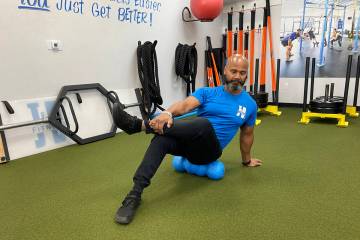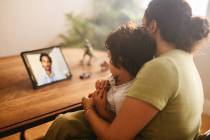Avoiding coronavirus about washing hands, not wearing gloves
It drives Johnny Church crazy.
“I saw a commercial where this lady’s gone out all day with her gloves on, and then goes to the door and takes them off,” said Church, a longtime local chef. “I just noticed it the other day when I was in the grocery store. That’s the worst thing you can do.”
Church is talking about cross-contamination, the transfer of a hazardous substance from one surface to another, which can happen if you’re wearing gloves or not. In the culinary world, cross-contamination can lead to food poisoning — if, say, the salmonella that’s tainted that raw meat or poultry is transferred to the raw apple you start munching. In the current climate, if you’re out and about, it can lead to COVID-19.
Say you wear the gloves to the grocery store. You touch lots of surfaces, many of which might be contaminated with the novel coronavirus. Then you get in your car and touch the steering wheel. Then, or maybe later, you touch your eyes, nose or mouth.
Those gloves haven’t protected you from anything.
“Wearing a glove does absolutely nothing for you when it comes to transmission of the virus,” said Dr. Shadaba Asad, medical director of infectious disease at University Medical Center.
“You walk into a grocery store and you pick up that piece of fruit” that carries the virus because someone who’s a carrier coughed on it, or sneezed on it, or touched it, she said. “That virus sitting on your hand cannot get into your body through your skin. It can’t get into your body by you eating that fruit or vegetable,” because it’s destroyed by stomach acid.
The important thing, she said, is to remember the two ways the virus is transmitted. “If you can understand, you can figure out what is helpful and what isn’t.”
If someone with the virus coughs or sneezes, he or she propels large, heavy particles into the air. If those particles enter your respiratory tract, you may get infected. But because they’re large and heavy, they dissipate.
“They don’t remain suspended in the air for a long period of time, and they don’t travel,” she said. “That is where the whole thing about 6 feet (apart) comes from.”
That’s the main way it’s transmitted, Asad said.
But if those particles happen to land on nearby surfaces, they may be around for a while — as long as 72 hours on plastic or stainless steel, three to four hours on paper. If you touch that surface and then happen to touch your eyes, nose or mouth — whether or not your hand is gloved — you may get the virus.
“If you have a gloved hand and you touch a contaminated surface, it’s of course not your hand that’s contaminated, it’s the glove,” said Dr. Cort Lohff, director of the Southern Nevada Health District’s residency program. “If you then touched your gloved hand to your eyes or nose or mouth or face, you’re potentially contaminating yourself.”
Lohff said it’s also important you take the gloves off properly, without touching the outer surface with an ungloved hand.
Asad said there is a set of safe practices for grocery shopping. First, use a sanitizing wipe on all surfaces of the cart you’re likely to touch. After shopping, squirt some sanitizer on your hands.
Put your grocery bags on a table or counter. Treat your fruits and vegetables as you always have by simply rinsing thoroughly, since you can’t get the virus by eating it. Throw the grocery bags in the trash. Then, using a solution of 4 teaspoons bleach in a quart of water, wipe down the surfaces where the bags were and the outside of any nonporous food containers you brought from the store. Wash your hands with soap, rubbing vigorously for at least 20 seconds.
Masks are useful, Asad said, in keeping contaminating particles from getting into the air, and as a reminder not to touch your face. (And remember to cover your nose, not just your mouth.)
But first and foremost, wash your hands.
“There’s a suitable alternative to wearing gloves, and that is that people should be washing their hands and using hand sanitizer,” Lohff said.
“Keep alcohol-based hand sanitizer with you at all times,” Asad said. “Make it a habit not to rub your eyes, your nose or your mouth. Maintain that distance. No matter what you’re out and about doing, those are the things you have to practice.”
Contact Heidi Knapp Rinella at hrinella@reviewjournal.com or 702-383-0474. Follow @HKRinella on Twitter.




























